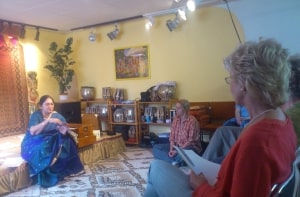Music Therapy is defined as the clinical and evidence-based use of music interventions to accomplish individualized goals within a therapeutic relationship by a qualified professional who has completed an approved music therapy program.
“Clinical & evidence-based”: There is an integral relationship between music therapy research and clinical practice.
“Music interventions”: This process is “purpose-driven” within a productive use of musical experience based on the IMTA Standards of Clinical Practice.
“Individualized goals within a therapeutic relationship”: This process includes assessment, treatment planning, therapeutic intervention, and evaluation of each client, by a Tri-Team consisting of a Doctor/Physician, Psychologist/Psychiatrist, and a Music Therapist.
“Professional Credentials: Each credential or professional designation (i.e., MT) requires a set of professional competencies to be fulfilled and maintained according to established professional standards.
“Approved music therapy program”: A degreed program based on standards and accredited by IMTA.
MUSIC THERAPY AVAILABLE FOR:
-
BLOOD PRESSURE
-
STRESS
-
MOTIVATION
-
AUTISM
-
PARKINSONS DISEASE
-
TENSION
-
SLEEPLESSNESS

Recorded Music for Therapy is available
Despite the fact that Music Therapy is in a very nascent stage in India, it is long since an accepted fact that Indian Culture has known and established the importance of Music as a part of treatment for many a disease. Ancient Hindu scriptures are full of instances of the use of Music for therapeutic purposes
An attempt has been to model these standards based on the best practices prevalent in the world including USA, Australia and UK. Where as in the US it is believed that there are over 26,000 Music Therapy Facilities, India cannot boast of any such. Even then, having a set of standards will help the existing Music Therapists, to impress upon the various hospitals, hospices and medical facilities to start such facilities and these standards will help to instill confidence in these, and help the Therapists in turn to offer alternative and complimentary aid in various treatments and therapies. By following these standards, the Music Therapists can inspire more and more people to opt for Music Therapy as an effective alternative and complimentary treatment. At the same time, it will inspire in the efficacy of music therapy and its delivery in patients.